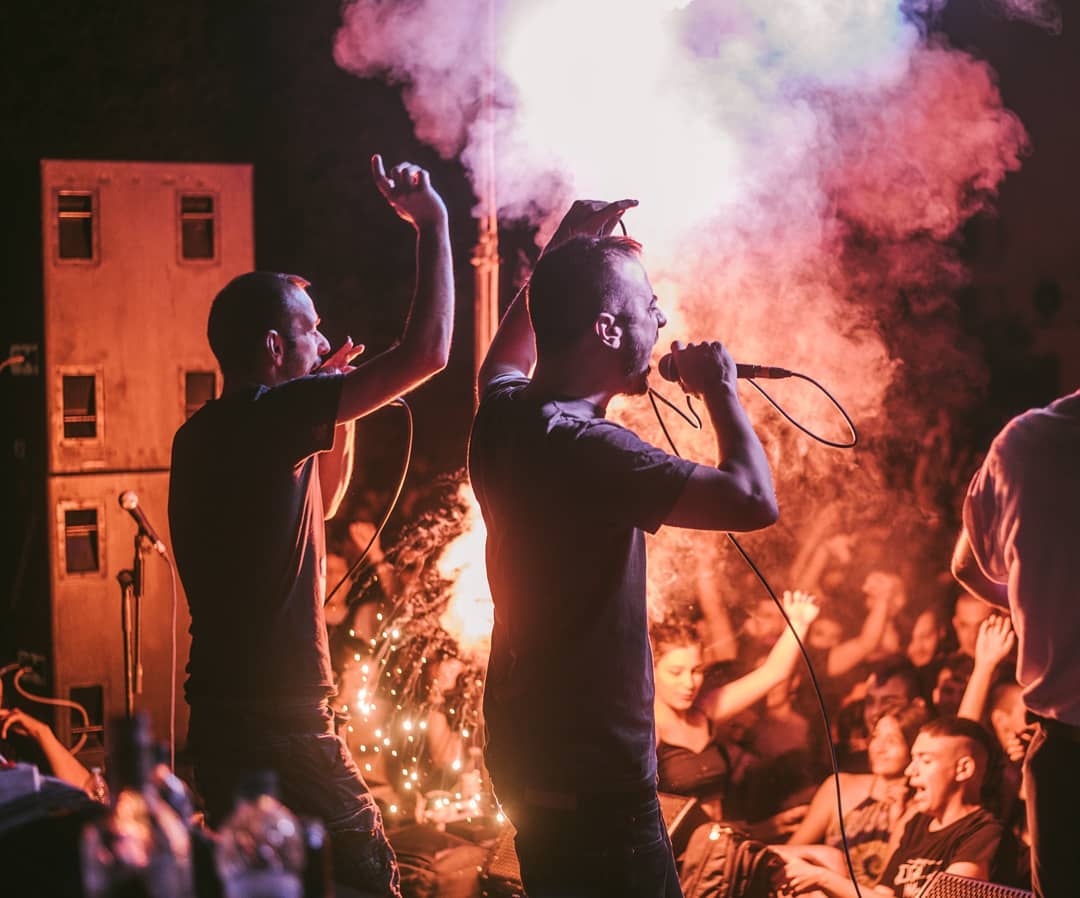DIO MIDEN DIO MIDEN (2x2x)
Interview
Conversation with one of our favorite bands: 2020/2x2x (KK, Hrwas, Incognito m., Jaul) after the release of their new album: Straight Outta Dystopia, which will be available on a USB stick as well.
Paul and I journeyed together from the release of their first track when I ran to share with him ‘a new Greek rap track you will certainly like‘ to his excited -huge- eyes at every new beat and choreo.
Now, whenever we meet at someone’s house or in the famous van, in Greece or France, Colomiers or Karditsa, a 2020 track is de facto playing among us. It’s a band we loved a lot, each for different reasons and from different perspectives.
Knowing them personally, we appreciated their music even more and look forward to singing together their lyrics again – with or without a French accent.
Polka B & Alkistis / Photos : John Mak

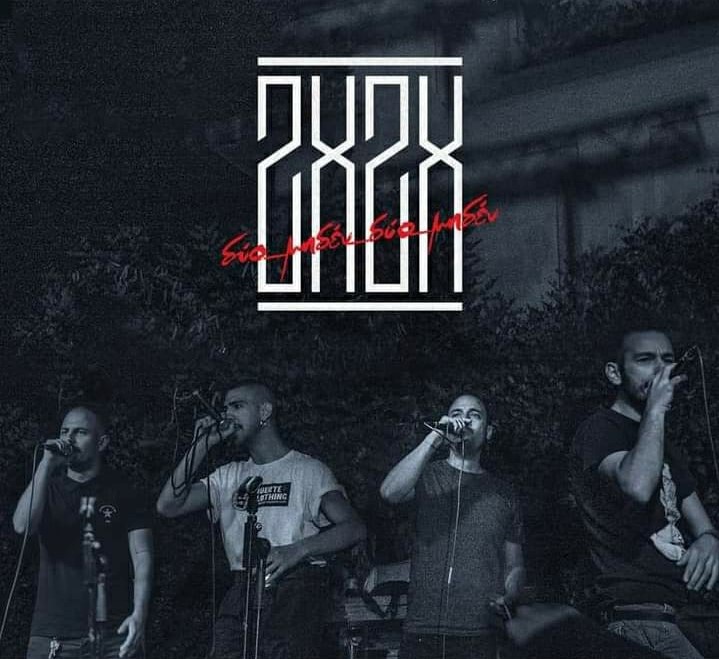
Was the formation of the group something that came up or that you were thinking about from the beginning?
Hrwas/ Spyros: We haven’t thought about it, we just wrote the first song without discussing anything.
KK / Kostas: I had thought about it!
Incognito m./Christos: The original idea was a wider project of our group of friends.
That is, to involve several people, a group of ten friends in each track. At that time that’s what we did. We would gather in the studio and hang out until the evening. Some nights we’d pitch in and write and that’s how the band was formed.
Kostas: One of those nights, Spyros brought his beat ‘Patission Benaki Arachovis’ and we all liked it very much. So, we were like: what if we write lyrics for this beat? and We did.


Your previous solo tracks were more of a boom-bap sound. Did you get bored of that style? Where is the genre of the group going now?
Spyros: We still like it and we still listen to boom-bap. The first beats I made for the band were in a more contemporary aesthetic because I had started listening and therefore writing different things. The first three were kind of common and then it went its own way…
When we decided to put something together, it was a unanimous decision of it being of a certain style and atmosphere.
Kostas : It was something different for all of us. Everyone brings their own elements, I for example like the oriental elements but I started to adapt to a more modern style.
There may be beats of both of us that are very similar and others that have nothing to do with one another. Still, I think we know which beat is for the band, different things come in between but in the end there is a consistency, especially on the 2nd album.
Christos : I don’t know if it’s subject to a genre because it has elements of a lot of hip hop currents and it’s our own, kind of new school sound. It was the golden mean for all of us because everyone had their own style -which was not very close to the band’s style. Our previous solo tracks were completely different from each other.
Jaul/Ioulios: Yes, this aesthetic came with the group. All the rest of the time (especially the rest of the guys who are dinosaurs) were rapping in a much more boom bap style.
Spyros : And the singing – choreo is our element now, since we have the nightingale of the DIY (aka KK). All the elements are very collective. We get along very well on artistic and musical terms. A fantastic chemistry has emerged.
Christos : We are becoming the same person musically. While we started out very different, we are slowly converging a lot towards the sound of the band.
Spyros : Transformers in Megazord!


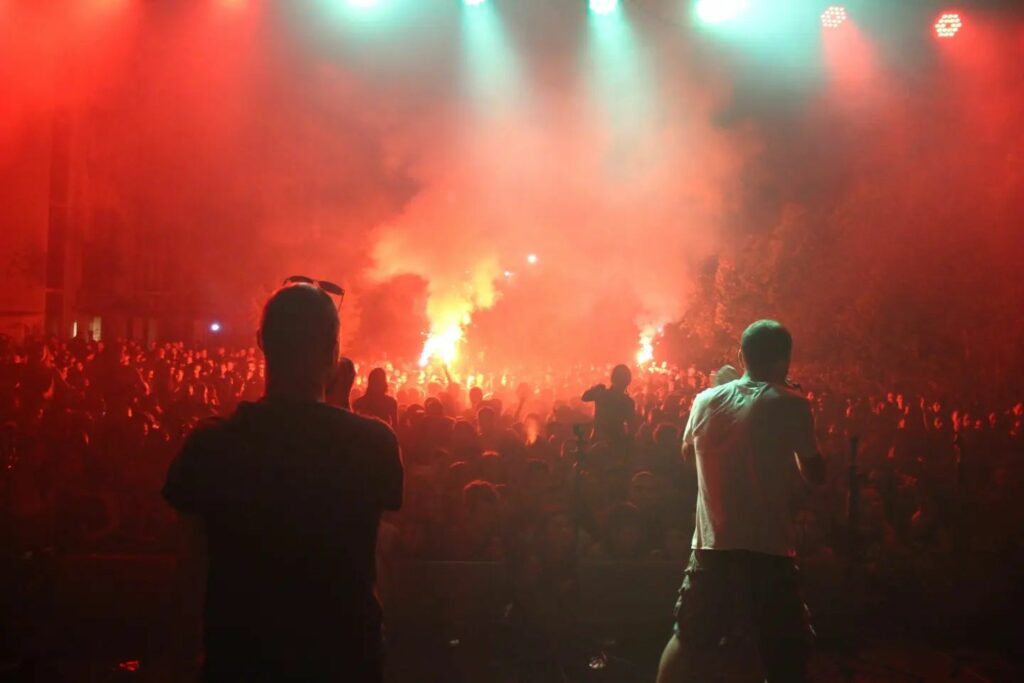
Which track are you listening to the most at the moment?
Kostas : I listen to Simadi a lot. I like miserable raps. Of course, Nionios has a bit of everything, he’s very good.
Christos : I’m still crushing J. Cole‘s record.
Spyros : I listen to Mount Everest and ta zygia mas (Grut x Unwound).
Ioulios : I listen to On the Map (Mick Jenkins x Badbadnotgood) and for the past year I’ve been listening to a lot of Lamda, a Greek band that has traditional, synthwave, post and rock elements and has achieved an extreme blend. I went to one of their live shows and was blown away, they are very dedicated and very good.
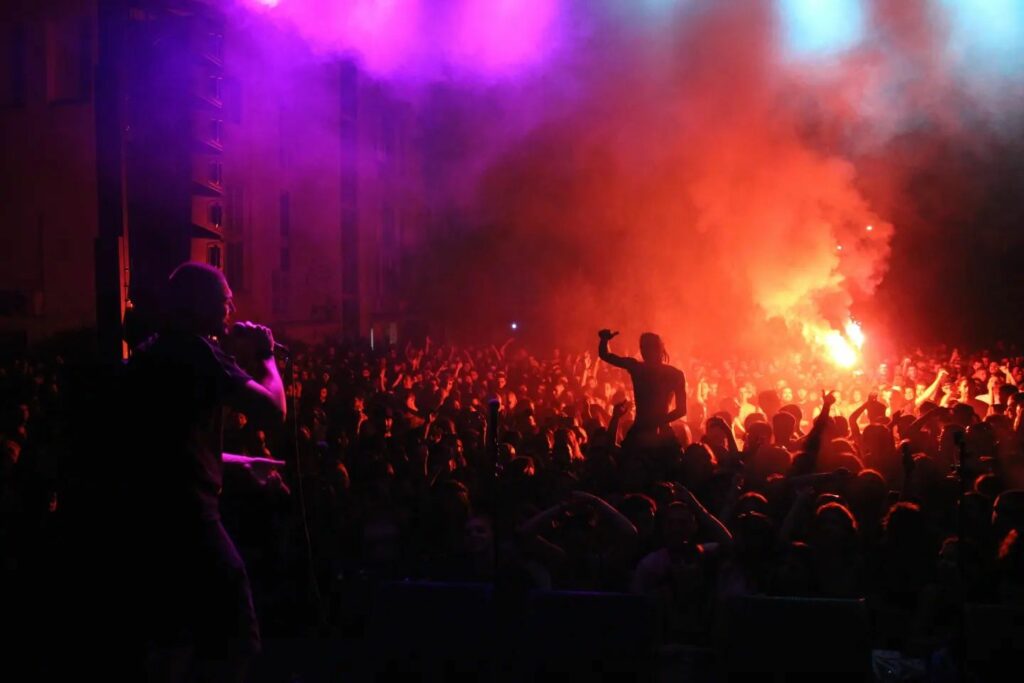
Which of your own tracks are you most attached to from the 1st and 2nd album?
*Answers occurred after pressure and negotiation.
Christos : I’ll go with Nyxterides! Both because I like it as a song and because there were so many things happening at that time that we captured in that song. Whenever I listen to it, I remember that time.
Spyros : From the new album I will say Topia and Cowabunga. From the previous one is Barco Pirata.
Kostas : Me too! Except that I really like it as a song: the music, the beat, the lyrics, the feeling it leaves me… I think if I made music on my own it would be very close to that style. From the new one “Topia”.
– Paul: Me too! And Maracana.
– Alkistis: I would say Nyxterides & Convoy.
Jaul : I can’t answer. No one prevails more. *After some more pressure*: Nyxterides, Kolosssaio and Maracana! From the new album Cowabunga.


How would you define the universe of your lyrics? Did you want to portray the paranoia of confinement (and the post covid era)? The control the state exerts over our lives? What other topics inspire you?
Jaul : The confinement part was not an aim in itself. It was just what was taking up more space in our heads at the time. We generally want to address the things that are going on.
Hrwas : It’s also inevitable because these things concern us as people as well. We discuss political current affairs a lot anyway, so that comes through in the tracks.
The first album is called Metakinisi 6 (*The text message we had to send during quarantine in order to be allowed to go out) and indeed many tracks have that element because that’s what we were living back then. But towards the end we don’t have many references to it. In general the ‘universe of lyrics’ moves politically, socially and experientially.
The last album doesn’t have so much of the actuality element, it also got the more intimate element in.
2X2X is a rap group from Greece; but apart from the country, it also represents a city. Is there a love-hate relationship with Athens? How would you describe it to someone who doesn’t know it?
Ioulios : I think we share to some extent how we feel about it because we didn’t grow up here. It’s very charming to me. It’s a Metropolis.
Christos : I also like it very much as a city. The disadvantages have to do mainly with the fact that we are in Greece, we can’t have a decent job and we are under pressure.
But if you want to do something, punk music for example, and you come to Athens, you will meet 100 other people like you, you have stimulation and you can develop what you want to do. It’s almost impossible to do it in a small city or village. It’s because of the population distribution. Athens has 6 million people and the rest of Greece has just as many.
Spyros : Gloom! But creative gloom.
Speaking of the artistic and creative part, as a city it has a lot of stimuli. It’s very nourishing. It’s got great potential. It’s really like a cardiogram, everything is at its peak. What I love, as someone who hasn’t grown up here, is that you see the raw realism. You see it all and it helps you understand a lot of things politically, socially, everything. I would definitely advise someone who hasn’t been here to give it a try. It’s very likely to freak them out but it’s worth trying.
Kostas : In here. Let’s freak out together.


The rap scene of Greece is more exciting than ever, especially after Covid we have seen a huge appeal. How do you see the DIY rap scene now?
Ioulios : I don’t know if it has to do with Covid or with the increase of the appeal of rap in Greece. Rap has always been loved and placed at the forefront but it’s the last 5-6 years that we’ve been seeing the tracks of artists of the movement getting so many views. It’s also about social awareness. People somehow started to appreciate political lyrics more. Before there was no Diy song with 500,000 views. The big rise of concerts also happened in the last five years
If someone asked me what I would like more I would say that rap should be intertwined with socio-political analysis, that it should not be divided into political and non-political rap. It is predominantly an experiential genre of music so it is hopeful that it gains popularity.
Christos: It’s a bit of a post-covid phenomenon. Before there were no diy concerts with 5-6 thousand people. And it’s a peculiar case of the country itself. Nowadays the numbers are insane considering the population of the country.
So it has more to do with that than with the fact that the movement has done a tremendous job and is being rewarded. On the other hand, it obviously played a role because the organization is much better now and the sound is of much higher quality. So I would say that the movement has stood up to the circumstances.
Spyros : The fact that some organizations in recent years have taken the issue very seriously plays a part as well. And so it should be.
When you want to create an anti-culture you have to compete deservedly with commercial and mainstream.
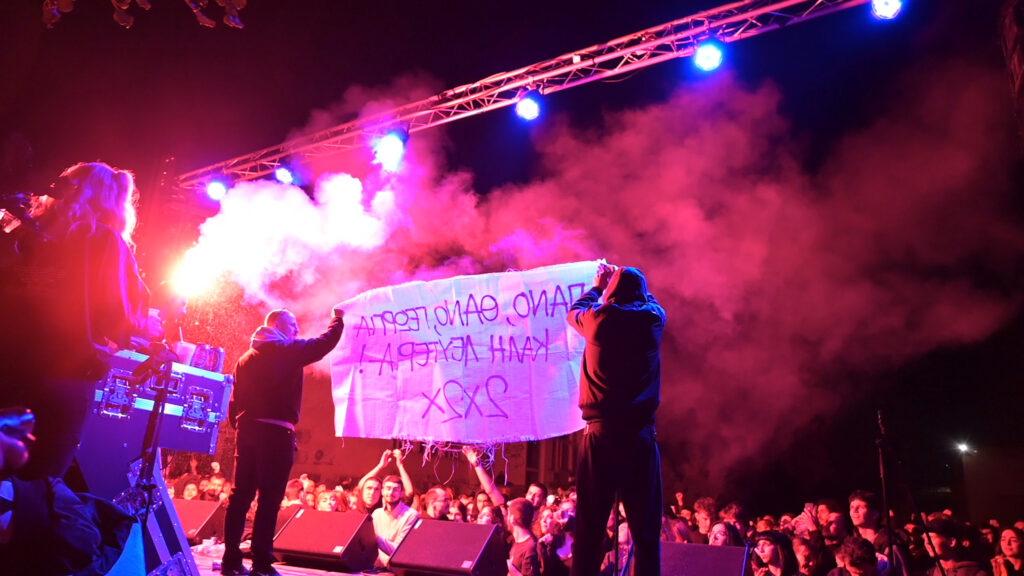
Ioulios : It certainly has to happen, but I don’t know if the reason is to compete with the industry. For me it’s more about deconstructing the narrative that DIY is something sketchy and ‘cheap’.
It’s important that self- organized concerts have nothing to envy commercial ones in terms of quality, organization and good sound. And some events have now achieved this.
Kostas : And to deconstruct the belief that you can’t create what you want if you don’t have money. Because you can, and on better terms.
Christos: There are many reasons why you need to be well organized. There is the practical issue that live shows are for financial support of a cause, so if the organization is good, a sum of money is secured for that cause.
At the same time, the collective builds a history of good concerts in people’s consciousness and will bring them to next ones.
Above all it is a political project. Self-organization is a ‘thumbnail image’ of the future we imagine. It has to be an appealing image to attract people and convince them that this can actually work.
However, beyond the appeal of rap, the realization of DIY/political events in Athens is becoming an increasingly difficult task. What is your opinion or prediction? Will we become like Europe?
Spyros : This is the movement’s bet. I am not in the “all or nothing” mindset:if it can’t be done on absolutely our terms, it shouldn’t be done at all. If they leave us nothing, we will find the very next solution. If that is to become Europe and rent some space to meet collectively and do concerts, we will do it.
Kostas : To me that would seem like a huge defeat.
Spyros : It’s a defeat but it’s better than doing nothing.
Christos : In every period the state defines these things, how the government of each country manages the situation: with tolerance or with severity. It depends on the time, the situation and the strength of the movement. We are in a transition as a country, which is also reflected in the movement. Now (and because of the rise of the movement events we mentioned) the government has started to fight them firmly and methodically.
The spaces are being significantly reduced and it is clear that this is where we are heading. The whole thing is heading to a neoliberal European direction in a progressive guise.
Spyros : There is also the government’s tactic to leave something like a decompression valve. They’ll leave something for you to play with. They might even take it all away, who knows?
Christos : Then it takes imagination, a little bit of courage and organization. We will always find ways.
In continuation of all the above and the difficulties faced by the movement collectively and the subjects individually. What is your view on the strong criticism – or even excommunication – of artists who decide to play in venues / with entrance fees.
Spyros : We personally are not touched by this malevolence. We may so far have chosen to play only at free live shows, but we don’t strictly stick to that and we are not against people who want to do something different.
We are working and we are doing music at the same time, because we like it. There are people who are musicians, that’s what they studied and that’s what they want to do.
You can’t tell a person who has spent their whole life studying and being involved in the subject (like Seirene, Aeon, Stolen Mic) to work in shitty jobs so they can only play at diy concerts..
We very often discuss how much more fun and creative our lives would be if we made a living from our music.
Christos : To be able to do music with consistency and continuity is a huge privilege.
When you work long hours for little money – as most people do – how do you find the free time and money to get serious about it?
Spyros : How do you define art that must be sacred and untainted? And why should only rap be it? Graphic design is art too, but it is payable.
Ioulios : This hypocrisy is so specific that it’s not even about rap. No one is going to indict a beat maker who sells his beats. It’s focused solely on the lyrics.
The prevailing narrative is that if your lyrics are political and you’re talking about an employer-employee relationship, it’s contradictory to play it in a venue. In terms of commercialization, Spotify and Υoutube (owned by google) are far worse than a venue or a concert hall. We’re talking about the epitome of capitalism but that’s where everyone wants to listen to their music from.
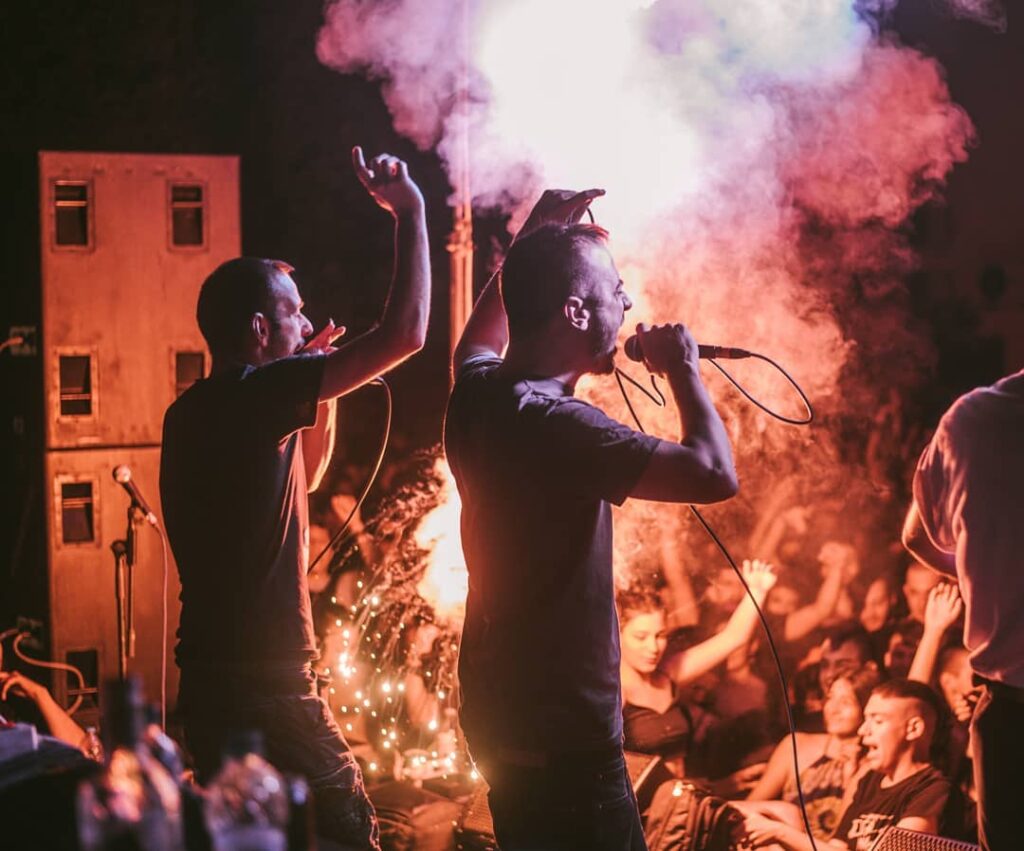
Christos : All of this lacks class analysis completely. The people who criticize are doing it from a subcultural point of view. The musician is a freelancer in terms of class. In recent years, the crushing percentage of this class has become terribly impoverished, and musicians in particular are probably the most undervalued caste of freelancers.
They’re paid black money, are fully underpaid, in precariousness and with no idea if they’re going to get a job next month. That’s why a lot of people are playing in the street to make a few bucks. Now I can’t understand why rap comes into another analysis and it seems apolitical to me.
Unless people think that anyone who makes music professionally makes the money that Light and Snik make (famous greek trappers). Completely out of touch with reality, it’s like comparing my friend Aris, who is an architect and works for 800 euros per month, to Bobolas (-greek millionaire).
Ioulios : The other narrative is also the “if you want, do it but don’t talk about politics” which is actually worse. It’s like censoring the artist and wanting to consume their music wherever, whenever and however you wish.
Christos: What they are saying is that the music of the movement should only be consumed within the movement
And that artists should change their lyrics depending on where they are playing. They are basically asking them to take out the political lyrics if they play in venues and make them commercial! If they do that they will still receive heavy criticism for not being consistent in their political discourse.
The movement should be demanding that poor musicians unite, join their unions, organize and fight for their class sector like any other profession.
As it was during the Covid era when we collectively as a movement demanded musicians’ salaries. I don’t know why we should treat it as anything different from a class perspective.

Coming back to the live shows…When you see all these people singing your lyrics by heart, you realize how many people identify with you. How do you feel about all that? With the ‘responsibility’ and the exposure?
Spyros : It’s undeniably a great feeling. It’s a beautiful thing to see so many people identify with something you’ve created and can’t wait to sing it with you.
Ioulios : And the exposure part is a choice. We also write tracks that never come out publicly. However, there is a magic in writing because there are things and emotions that you can’t express and paper gives you that freedom, that is, to set a thought to music and make it a form of art.
Christos : On the other hand, songs also have a political character, a character of intervention in the reality we live in. When we write them we have in mind that they are externalized, meaning that we speak towards society.
There it is a double joy, taking a political stand and putting it out there. It is a double satisfaction.


In this way, perhaps young people who have no contact with the diy world are positively influenced?
Kostas : When I was younger I was listening to tracks and I had a lot of unfamiliar words, I heard a lot of things I didn’t understand and I was constantly looking for what they meant. Infinite stimuli. I took the tracks I was listening to very seriously and they really formed me. At the end of the day, putting something out there needs serious consideration and that’s how it should be treated by anyone who makes music whether 10 people or 10 million people listen to it.
Spyros : It happens very often that we get messages from younger people asking us how much admission the live shows have, because they don’t know that this exists for free. It’s a world they haven’t met and it’s great if we can bring these people into a certain culture, get some stimulation and find themselves in this fertile ground.
Kostas : So people see something they may not know when they listen to tracks on the internet alone: there is music that is not corporately supported and has nothing to envy from mainstream music in terms of quality.
At your concerts we usually see femininities in front and there’s an atmosphere that is rather safe and inclusive than macho/sexist – something that was not common in rap lives. Is that something you seek? Or that came from the movement itself?
Christos : There have been feminist groups for years – and lately a lot more – that have been claiming and have managed to get a large part of society to adapt to this thing. And I use the word adapt because there are also oppositional elements who disagree but they have learned in these spaces to behave this way because they can’t take it any other way.
Along with this conquest of the feminist movement come the collectives/artists who are now more conscious. I would say it is an outgrowth of the original subject that brought it to the table. And as we take a stand on everything, we take a stand on this too. It’s obvious for us. Just like a fascist can’t show up, a sexist-abuser can’t show up.
We all evolve and reconsider but when there is a larger climate pushing in that direction it inevitably happens and becomes somewhat educational.
Spyros : We would ideally like to not even be listened to by assholes. If we manage to influence someone who is already an asshole, even better. But yes, the space has been won by feminists themselves. Obviously the rise of female rap, which we love and hopefully there will be many more, plays a big part. We address it as much as we are entitled to. We want our live shows to feel safe for all individuals.
Ioulios : It’s not something we ‘seek’ for the reasons the others mentioned. What happens as a result makes us happy, just as it makes us happy to provide a safe environment. We take the positions we are taking as honestly as we can and most importantly with respect because we in no way want to romanticize or appropriate the experience of femininities.

I left the most essential for the end… How was 2020 decided as the name of the band?
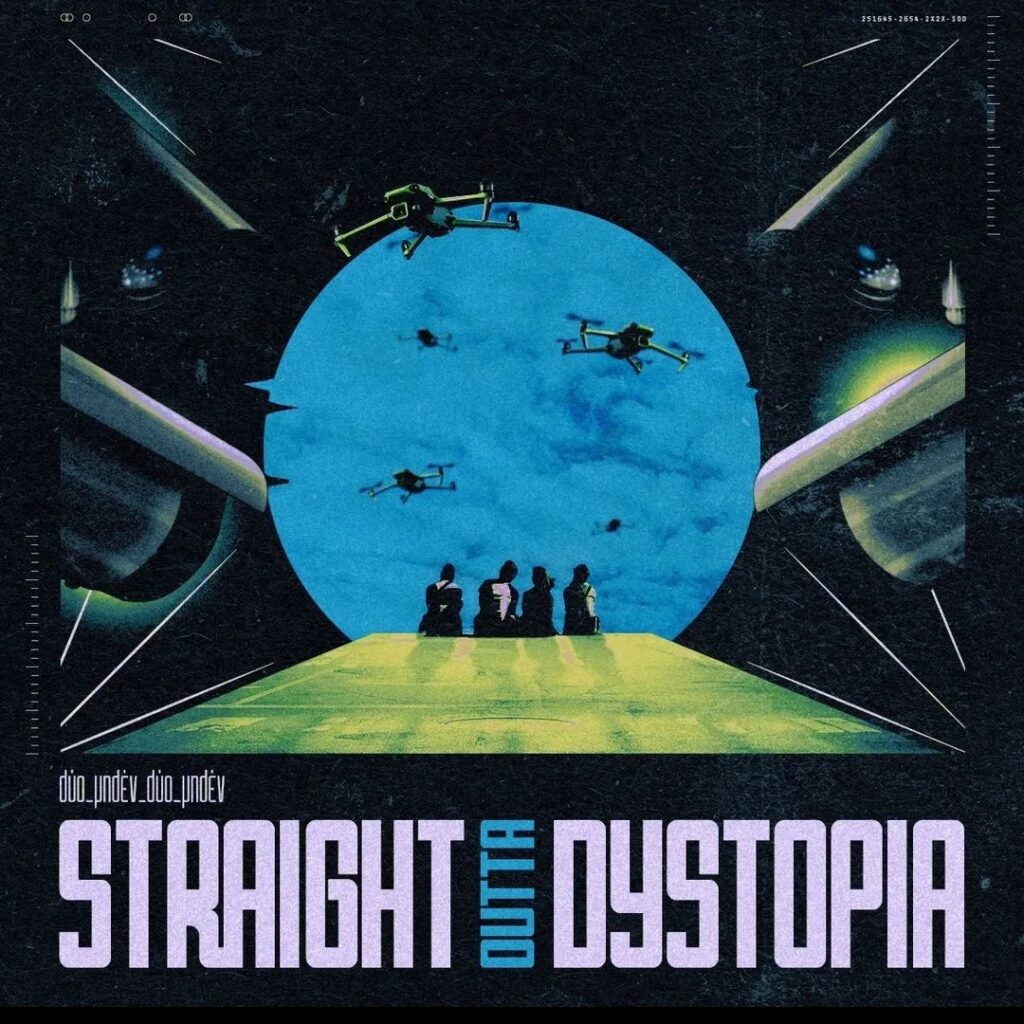
Jaul : In the beginning there was no name or notion of a band. In fact, the first songs and posters had our names separately. 2020 as a name was conceived after ‘Nyxterides’. Obviously, it comes from the year but there was a long process in choosing the name. We didn’t like anything and we’re still holding on to that -not being able to decide on titles.
But even if at first the title isn’t something that inspires or excites you, over time it takes on a different significance.
Hrwas: I think the most interesting part is how we got to 2x2x instead of 2020. Christos will explain.
Incognito m.: So, I had been to the Tattoo Circus event with no intention of getting tattooed. But I sat around long enough to want to and I decided to get something related to the band. And while I was drawing I liked the ‘x’ more than the ‘0’ aesthetically. And it does look better graphically and semantically.
Jaul: Then, he called me and suggested we’re getting matching tattoos. I thought he was kidding until I got there and saw him hitting “2x2x”. I said “What’s that?” I called Spyros and told him to make some fonts that said “2x2x”. And he goes, “What’s that?“. So I hit it straight away and then we tried to convince the other two – who had no tattoos so far. Eventually they did it too. To be honest, I was thinking at first that Christos put the X on it, in case at some point we weren’t a band anymore.
Kostas: Yeah but this can’t change its meaning. It will always mean that.
*”Does this sell?”
“Yes, it does!”

FARM FESTIVAL
Kostas, tell us about the Farm festival you are participating in!
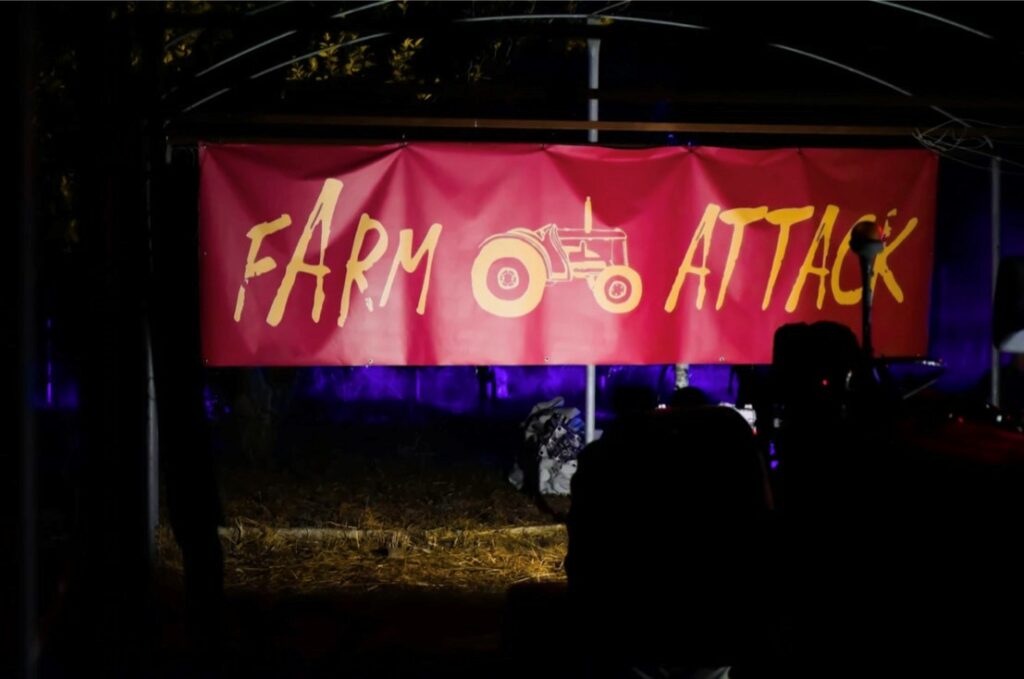
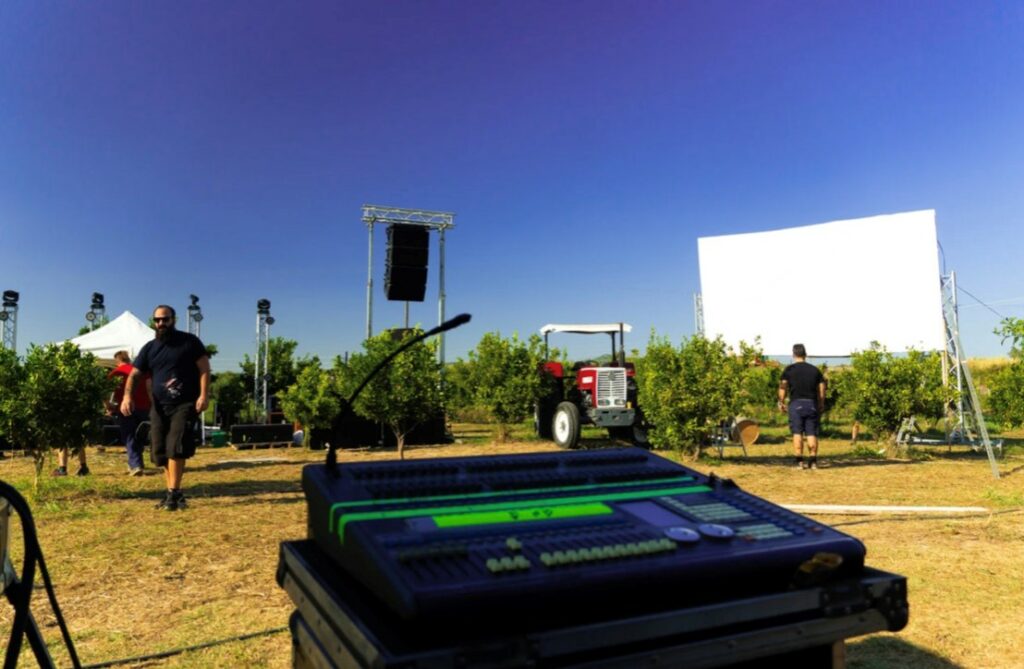
It’s a DIY festival with metal, hardcore, punk, crust bands that takes place on a farm in Pyrgos. It takes place every first full moon of September for 5-6 years now. With the band I play with (bass) in Pyrgos, we rehearsed in a house we called a farm among us – hence the name.
We decided at some point to take the equipment and go to a friend’s field with tangerine trees to play there, we set it up, put in some souvlakia & beers and a small festival was created.
The next year we brought a tractor, the next year another one. At some point we started bringing in more bands and now it’s become like a custom.
It gathers around 500 people, which for this little city and for an event with no admission and no advertising is a big deal. We put spools for tables, crates for chairs, decorative lights and a very beautiful event is created in a very family-like and festive atmosphere.
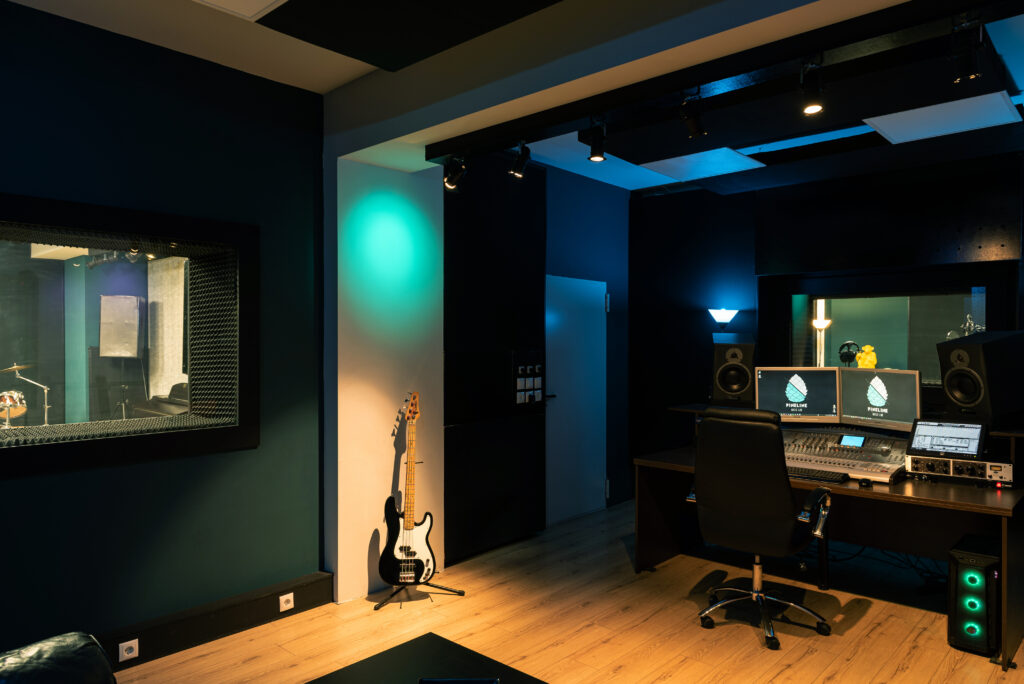
PINELINE MUSIC LAB
Now Christos, tell us how Pineline music lab was created!
Since I started to deal with music, apart from the lyrics and production, I started to have a contact with the recording and editing part of the sound. In the beginning I had no passion for recording and mixing, it was the boring but necessary stage I had to endure in order to make a track. Basically the contact with the subject was occurred by the lack of money. We couldn’t afford to go to a studio to record and inevitably with my crew back then, we bought a console, a microphone and headphones and started making music. Later on when I was a student in Serres I started to be attracted to the technical part of production and so I bought some books on sound engineering and acoustic design.
I turned my living room into a studio, studied for hours about sound and practiced on my own and my friends’ tracks.
A short time later I started doing it semi-professionally and making a little pocket money. Then I realized that this is the job I wanted to pursue and I started taking it seriously. We got together with 2 other friends and we decided to build a studio in Athens, for quite some time we worked hard to make money to get the first equipment. I was a bartender and waiter in Corfu and my friend went to England to work. In 2016 we rented a space that we used both as a house and as a studio, that’s where Pineline started. For about 3 years I worked as a deliverer in the morning and at the studio at night. I used money from the day job to pay rent, bills etc and money from the studio to get new equipment.
At one point two very good friends of mine bought a bar in the center of Athens, where the 1st floor was empty and soundproofed, so we decided to take the studio there.
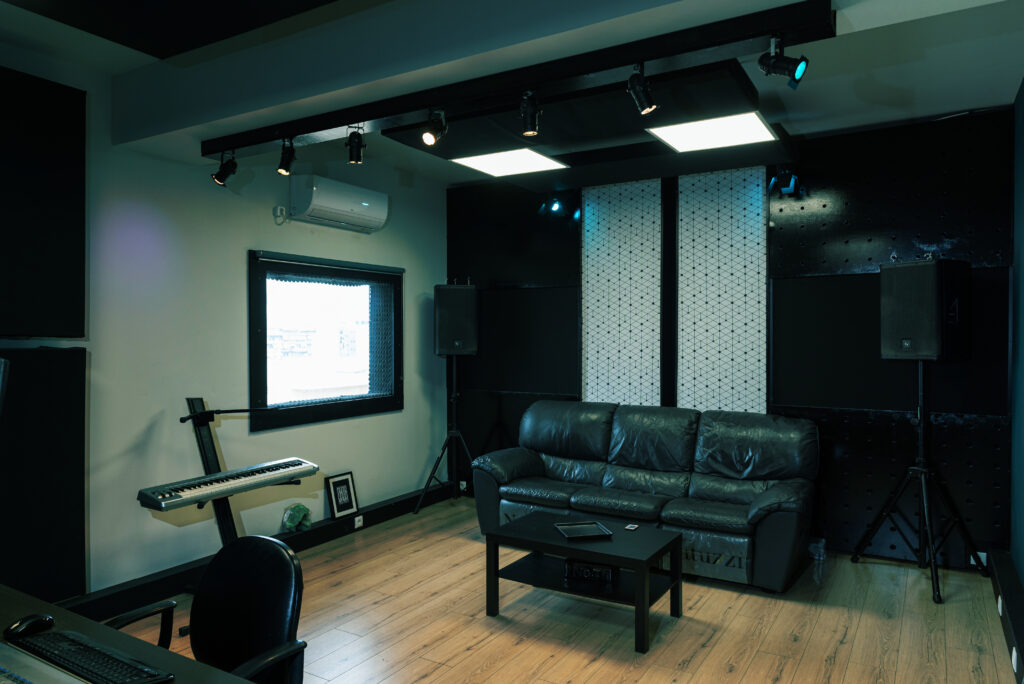
We took it from the very first start, painted it, renovated it, fixed the acoustics of the space, turned it into a studio and started working on it. That’s when I quit the delivery job and my only job was now what I really wanted to do. The other two friends, Kon and Dotsi, who we started it together, left the recording part and focused on music since they both had graduated in musicology and that was their job.
In that space a lot of music was created, many albums were released both by our own lads and by quite mainstream artists, as well as of other genres of music (from jazz and punk rock to traditional and tarantella of southern Italy). Also, in this place there were many configurations (political and artistic), parties, gatherings and in general a lot of people came and went since there was a bar above and below the studio and after the sessions we all hung out together. That’s where the 2x2X was born.
Somewhere in early 2021 due to the situation with covid, the friend who rented the place could no longer afford to maintain it and had to close it down. So everything had to be done for the 3rd time from scratch, searching for space, planning, repairing etc.
There was a lot of searching and reading involved, especially regarding the acoustic study of the space. I had focused a lot on that because it is crucial for high quality recording and mixing, and unfortunately in Greece it comes in second place or is sometimes completely neglected.
After the space was found and I did the design and the study, we threw ourselves into the construction, electrics, doors, floors, soundproofing for 6 months. We did almost everything ourselves, very few craftsmen beyond the group entered the space. So we built the place and Pineline is permanently installed here. Finally, I want to say that without my friends nothing would have happened. I truly feel grateful for everything and I am very proud to have them as friends.
